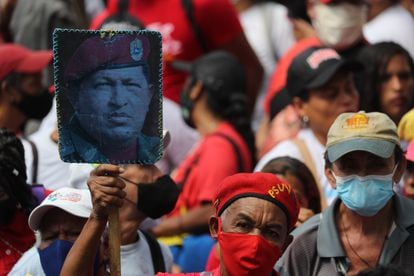Hundreds of people participate in the commemorative march of February 4, 1992, when a failed coup d'état was carried out in Venezuela.MIGUEL GUTIERREZ (EFE)
On Monday, February 3, 1992, at midnight, Venezuelans learned that some Army battalions had risen up in the city of Maracay, the most important military base in the country, and were leaving for Caracas with the aim of take the Miraflores Palace by force to depose the acting president, Carlos Andrés Pérez, elected in 1988.
Nobody slept that night.
It reached its climax a political crisis that had broken out in 1989 after the popular riots of February 27 of that year, known as
El Caracazo
, and which were followed by student protests and growing rumors of military unrest, which cracked the foundations of which, Until the 1980s, it had been one of the most stable and successful democracies in Latin America.
The Government of Carlos Andrés Pérez had undertaken a series of market reforms that had social consequences in a country accustomed to abundance.
The emerging forces of the left and some media outlets openly opposed the measures.
The country thus entered the culmination of an economic crisis that had been incubating since the 1980s.
The seditious attempt was resolved around dawn. So, the whole country was able to put a face to the person responsible. In the early hours of the morning of the 4th, Lieutenant Colonel Hugo Chávez Frías, then 37 years old, called for the surrender of his companions with a compact and eloquent speech. Chávez personally assumed responsibility for “this Bolivarian military movement” and announced that, “for now”, the goal of conquering power had not been possible.
30 years after that long night, Chavismo has organized this Friday a rally on Paseo Los Próceres to commemorate its founding date, a sacred milestone for revolutionary militancy and that once brought together crowds.
Diosdado Cabello, who accompanied Chavez in the coup, was announced as the speaker.
The hashtags that dominated social networks during the day were #RebelliónPermanete and #DiaDeLaDignidadNacional.
During all these years, 4-F has been the star event of political polarization in Venezuela.
It was a sympathetic event in much of the country, once justifying the coup but now increasingly lamented.
The sociologist and intellectual Tulio Hernández remembers having a personal conversation with Ramón J. Velásquez —historian, writer and interim president of Venezuela in 1993— about the consequences of the coup.
"He told me that [that day] in Venezuela we had reopened the lid of hell where we had kept the demons of militarism, which had cost us so much work to dominate."
Hugo Chávez's coup was justified by an important part of national public opinion during the early 1990s. Venezuelan democracy, which had enormous popular roots for several decades, and which carried out most of the infrastructure and service works in the The country was going through a harsh period of disrepute due to economic stagnation, the political corruption of the two parties that supported the system, and the excesses of some media outlets that fostered discredit towards the public.
During 1992, the idea of the illegitimacy of the elected authorities became consolidated in the country.
"Chávez's failed coup returned the country to a situation that we thought had been overcome, the coup, a habit that has returned to the national political imagination, always as a hypothesis, and not only in Chavismo," says historian and writer Tomás Straka.
“Chávez failed militarily, but he succeeded politically.
In my generation, we never knew what a coup was, those were anecdotes from our parents”, he adds.
In the public siege of Pérez, the word and the stark diagnosis of the intellectual Arturo Uslar Pietri, a highly listened-to figure at that time, who permanently requested his resignation from power, had enormous weight.
"The president's vanity prevented him from realizing the plot that was taking place in the barracks, which was alerted to him, and the political operation that took flight to remove him from power that materialized later," comments the sociologist Hernández.
Hugo Chávez and the rest of the rebel commanders on 4-F were taken to the Yare Prison.
Two years later, they would be pardoned by the new president, Rafael Caldera, an enemy of Carlos Andrés Pérez and who was considered one of the founders of democracy.
Chavez's pardon was a sympathetic cause proposed by several presidential candidates.
Pérez was forced to resign from the presidency in 1993 due to a court case in which he was accused of mishandling public funds.
He spent two years in prison.
After decades of political success, Venezuelan democracy based on the Puntofijo Pact failed among the population and began to be the object of stark and fierce criticism.
At the end of the 1990s, already free, Hugo Chávez began to tour neighborhoods with a vernacular, rural, brave, defiant discourse, compulsively citing Simón Bolívar, who progressively took flight in the impoverished sectors of the population, half of the country. .
He cried out against the end of the oligarchies, the end of representative democracy and its elites, to propose a new model: the protagonist democracy that he embodied.
In 1998 he won the elections that would bring him to power.
The rest of the story is already history.
“Democracies must be taken care of.
February 4 is a turning point that twisted our destiny and plunged it into the current abyss," says political scientist and academic Carmen Beatriz Fernández, who adds: "On the other hand, Chávez was a leader with enormous attributes, a perfect synthesis political-military as a person, the first great charismatic populist of this era”.
Six years after coming to power, Chávez began to talk about Socialism of the 21st Century.
Subscribe here to the EL PAÍS América newsletter and receive all the key information on current affairs in the region

